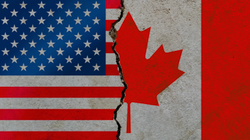How Trump's Tariffs Could Create Opportunities for Canadian Small Businesses
Posted by Zakka Canada on 20th Mar 2025
As President Trump begins his second term in office, his renewed focus on tariffs has many Canadian small business owners concerned about potential impacts on trade relations. While these tariffs present legitimate challenges, they may also create unexpected opportunities for nimble Canadian businesses. Let's explore how this shifting economic landscape could potentially benefit your small business.
Reduced Competition from US Imports
With new tariffs likely increasing the cost of American goods entering the Canadian market, local Canadian businesses may find themselves in a more competitive position. When US products become more expensive due to tariff-related price increases, Canadian consumers often turn to domestic alternatives. This shift in consumer behavior creates an opportunity for Canadian small businesses to capture market share that was previously dominated by American imports.
Enhanced Local Supply Chain Development
As cross-border commerce becomes more complex, many Canadian businesses are reconsidering their supply chains. This reconsideration often leads to developing more robust domestic supply networks, creating opportunities for Canadian small businesses to become suppliers to larger Canadian corporations. By positioning your business as a reliable local alternative to US suppliers, you can potentially secure longer-term contracts with Canadian companies looking to "tariff-proof" their operations.
Access to New Markets Beyond the US
While the US has traditionally been Canada's largest trading partner, tariff tensions may accelerate the diversification of Canadian exports. The Comprehensive Economic and Trade Agreement (CETA) with the European Union and the Comprehensive and Progressive Agreement for Trans-Pacific Partnership (CPTPP) open doors to markets that may have been previously overlooked in favor of the more familiar US market. Small businesses that explore these alternative export destinations may find less competition and more favorable trading terms than they would have in the American market.
Innovation Catalyst
Economic challenges often spark innovation. As Canadian small businesses adapt to changing trade conditions, many will develop new products, services, or processes that differentiate them from international competitors. This innovation can lead to more resilient business models and potentially open up entirely new market segments.
Reevaluating Your Business Strategy
To capitalize on these potential opportunities, consider the following strategies:
Conduct a tariff impact assessment: Understand exactly how your business might be affected, both directly and indirectly through your supply chain
Emphasize your "Canadian-made" advantage: Marketing that highlights local production may resonate more strongly with Canadian consumers looking to support domestic businesses.
Explore government support programs: Various federal and provincial programs exist to help small businesses adapt to changing trade conditions.
Invest in efficiency: With potential cost increases in imported materials, finding ways to improve operational efficiency can maintain profit margins without raising prices.
Build resilience through diversification: Consider diversifying both your supplier base and your customer markets to reduce dependency on US trade.
Moving Forward with Confidence
While tariffs create uncertainty, they also reshape competitive landscapes in ways that alert entrepreneurs can leverage. By remaining flexible, focusing on your unique advantages as a Canadian business, and proactively seeking new opportunities, your small business can navigate these economic shifts successfully.
Remember that throughout Canada's history, periods of trade disruption have often led to stronger domestic industries. With thoughtful planning and bold execution, your business could emerge from this period of change more robust and competitive than before.

